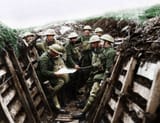Search Results
7/5/2025, 10:28:33 PM
Since its rise to dominance, Western Civilization was always led by a European country, up until 1945.
In the 1400s, Portugal was the most dynamic country in Europe, sending expeditions around the entire continent of Africa and all the way to India, founding the trading city of Goa in India.
After the discovery of the New World funded by the Spanish Crown, Spain became Europe's superpower and the vanguard of Western Civilization for about a century and half.
In the latter 1600s, the tiny Dutch Republic became the most dynamic European power, growing immensely in wealth and influence due to excellent trade relationships, especially in what today is Indonesia. The established powers of the time, which were Spain, France, and England, looked at the Dutch Republic as an upstart unworthy to be the leading power of Europe and so they ganged up in the Netherlands to attack its trade routes and defeat the Dutch Republic militarily. It worked, but during the Dutch Golden Age of the latter 17th century, the Dutch were Western Civilization's most advanced nation.
Then comes France in the 1700s; France was Europe's dominant power until the French Revolution, which kicked off a quarter century of continent-wide warfare that ended with the Battle of Waterloo in 1815. After Waterloo, the British Empire became the leader of Europe and the vanguard of Western Civilization.
The Pax Britannica lasted until 1914 with the outbreak of World War I, which shattered the perception of peace and stability guaranteed by British might.
Between 1914 and 1945, the West didn't have a clear leading country, though the British Empire remained the most powerful country in the world.
Of course, after World War II, Europe was in a bad state, its morale was shattered, the will to fight to maintain their colonial holdings was gone, and so Europe's colonies began to break away and form independent countries, starting with India in 1947.
The US emerged as the leading power in the West in 1945.
In the 1400s, Portugal was the most dynamic country in Europe, sending expeditions around the entire continent of Africa and all the way to India, founding the trading city of Goa in India.
After the discovery of the New World funded by the Spanish Crown, Spain became Europe's superpower and the vanguard of Western Civilization for about a century and half.
In the latter 1600s, the tiny Dutch Republic became the most dynamic European power, growing immensely in wealth and influence due to excellent trade relationships, especially in what today is Indonesia. The established powers of the time, which were Spain, France, and England, looked at the Dutch Republic as an upstart unworthy to be the leading power of Europe and so they ganged up in the Netherlands to attack its trade routes and defeat the Dutch Republic militarily. It worked, but during the Dutch Golden Age of the latter 17th century, the Dutch were Western Civilization's most advanced nation.
Then comes France in the 1700s; France was Europe's dominant power until the French Revolution, which kicked off a quarter century of continent-wide warfare that ended with the Battle of Waterloo in 1815. After Waterloo, the British Empire became the leader of Europe and the vanguard of Western Civilization.
The Pax Britannica lasted until 1914 with the outbreak of World War I, which shattered the perception of peace and stability guaranteed by British might.
Between 1914 and 1945, the West didn't have a clear leading country, though the British Empire remained the most powerful country in the world.
Of course, after World War II, Europe was in a bad state, its morale was shattered, the will to fight to maintain their colonial holdings was gone, and so Europe's colonies began to break away and form independent countries, starting with India in 1947.
The US emerged as the leading power in the West in 1945.
Page 1
